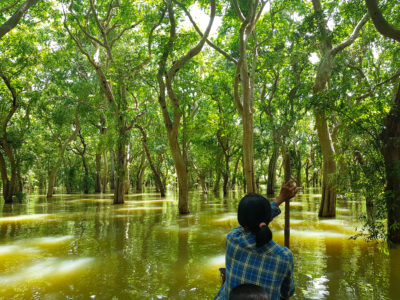Oceans and marine environments play a critical role in feeding the future and addressing the impacts of climate change. Not only do marine environments absorb carbon, but they can also act as a buffer against catastrophic weather events. More importantly, when managed correctly they can be a source of healthy sustainable food. In this blog we will explore how oceans and wetlands can be cultivated and restored to improve our life on land.
Like forests, oceans and marine environments are considered “carbon sinks.” Carbon sinks are natural environments that can absorb carbon dioxide from the atmosphere. In fact, coastal wetlands, mangroves, seagrasses, and kelp forests can sequester carbon dioxide from the atmosphere at rates up to 40 times greater than terrestrial forests. The world’s oceans, in addition to generating the world’s oxygen, absorb a quarter of all carbon dioxide (CO2) emissions.
Unfortunately, human activity has increased the levels of carbon dioxide (CO2) in the atmosphere. Consequently, there are higher amounts of CO2 dissolving in the ocean. The result of this increased absorption is pH change known as ocean acidification. Ocean acidification is disrupting ocean biomes and altering food chains that in turn impact human supply chains. There is significant research being done to understand how the oceans’ own biological mechanisms can be used to reduce acidity. For example, there has been increased investment in restoring the marine ecosystem like restoring coral reefs and cultivating shellfish together with seaweed and kelp. Seaweed and kelp create biodiverse algal forests that are highly effective at capturing carbon.

Above: Using a community-based conservation model, Belize has regenerated a coral barrier reef destroyed by climate change. This investment saves an endangered corral ecosystem while fueling the country’s tourism economy.
While much of FIC’s focus is on land-based agriculture, it’s important to recognize that aquatic environments are important sources of food. While seafood is not consumed in vast amounts in the United States because of its relative higher cost than meat and poultry, globally seafood consumption has quadrupled in the last 50 years. If we are to protect this vital food supply, policies regarding regulating pollutants and land use will play a prominent role; however, the marine environments themselves can be part of the solution.
Wetlands and mangroves sequester carbon dioxide from the atmosphere, but they also protect coastal areas from climate related disasters. Mangroves act as buffer zones against storm surges and rising sea-levels associated with climate change. Unfortunately, intensive shrimp farming has decimated much of these natural defenses against coastal loss. There have been significant efforts to restore these natural buffer zones. Unlike manufactured seawalls, restored mangrove sites are more effective at preventing damage to land and property and are cheaper.
The benefits of wetland and mangrove restoration go beyond protecting against coastal weather events. Throughout the world, wetland restoration has not only proved to be a successful tool in reducing flooding events by stabilizing the shoreline and preventing erosion, but the rewilded areas also clean the local water supply and provide a habitat for fish to thrive. For example, in Nigeria, mangroves have been significantly degraded, but due to restoration efforts there has been a 25% increase in recovered wetlands. And in Cambodia, rewilding efforts empower local women to become more involved in the improvement efforts. More ecosystem-based management practices like these are key to sustainability and need to be adequately resourced.

Above: Women have led the effort in Cambodia to rewild the mangroves.
At FIC we value ecosystem-based approaches to sustainability. If we have learned nothing else from the failings of land-based modern agriculture, it is that unmitigated extraction comes with dire consequences. If we are to adequately address climate change and provide nutritious food for all, we will need to do so in a way that promotes health and well-being. This can only be achieved by resourcing and employing solutions that not only “feed the world” but preserve it.
Do you like our blog? If YES, then sign up for our email list! Be the first to receive our alerts, updates and newsletters.